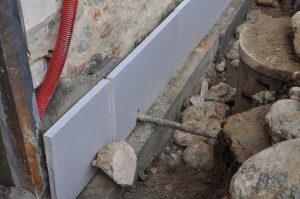Understanding the Different Styles of Home Foundation

The foundation is the base of every home or commercial building, and it sets the stage for the quality and longevity of the final structure.
The foundation is the base of every home or commercial building, and it sets the stage for the quality and longevity of the final structure. If you are choosing the foundation for your home or looking to learn more about your current foundation, here is what you need to know about the different styles of home foundations!
A Basement
Many homes have basements, and this foundation style begins with a hole in the ground about 8 feet deep. Basement walls are formed using cinder blocks and a concrete slab is the base of the room. The basement-style foundation is constructed in three phases: beams are poured, walls are poured, and the concrete slab inside of the walls is poured. By doing things in this order, you will end up with a waterproof finished product. Basements are a popular foundation style because they add usable square footage to the home.
A Crawlspace
Crawlspaces are used in homes that are about 2 feet off the ground. Crawlspace home foundations are usually constructed with cinder blocks and bricks. This style of foundation is common in wet climates where water would accumulate around the base of the foundation otherwise. An elevated home with a crawlspace underneath will be safer from flooding or frequent rain. Homes will also be less likely to have a problem with termites or rodent infestations.
A Pier and Beam Foundation
This style of home foundation combines concrete piers and wooden posts to hold the weight of the home. A pier and beam foundation is placed about 1 ½ feet over the base of the ground so that utilities can be installed in the crawlspace. This is a surprisingly common style of foundation because it works very well for small homes and is less expensive to build than other types.
A Concrete Slab
Slab-style foundations are made from concrete poured directly at the home site. These foundations don’t require much preparation and are very easy to install. The concrete slab foundations are typically about 2 feet deep on the edges and less than 1 foot thick in the remaining areas. Slab foundations are used most frequently in warmer climates.
Residential Grading from All Aspects Waterproofing
If you are ready to get a professional to waterproof your home’s basement, contact All Aspects Waterproofing, a Better Business Bureau A+ rated company with over 30 years of experience in the Washington, DC./Maryland/Virginia area. We have a great deal of experience in waterproofing, mold testing, and mold remediation, and we want to make you feel at home again. Contact us online or by calling 1-866-999-3110 or 301-766-4420. To see what we’re up to, follow us on Facebook, Twitter, Google+, Pinterest, YouTube, LinkedIn, and Houzz.
